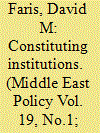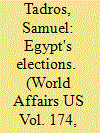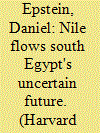|
|
|
Sort Order |
|
|
|
Items / Page
|
|
|
|
|
|
|
| Srl | Item |
| 1 |
ID:
112122


|
|
|
| 2 |
ID:
115066


|
|
|
|
|
| Publication |
2012.
|
| Summary/Abstract |
When asked on January 30, 2011, about the Muslim Brotherhood's role in post-Arab Spring Egypt, the man seen by the media as a leading figure in the uprising, Mohamed ElBaradei, brushed aside Western fears: "They are not a majority of the Egyptian people. They will not be more than maybe twenty percent of the Egyptian people." For ElBaradei, Western fears of the Islamists dominating the Egyptian future were "a myth that was sold by the Mubarak regime." Nor was the former IAEA chief and Egyptian presidential hopeful alone in his insistence that the Muslim Brotherhood was only a harmless minority. President Obama agreed: "I think they're one faction in Egypt. They don't have majority support in Egypt."
|
|
|
|
|
|
|
|
|
|
|
|
|
|
|
|
| 3 |
ID:
133462


|
|
|
|
|
| Publication |
2014.
|
| Summary/Abstract |
During a private conversation following Egypt's bitterly contested and closely fought presidential election of 2012, a Western diplomat marveled, naively, at the multitudes of veiled women who had come out to support the old regime's candidate, the avowedly anti-Islamist figure of Ahmed Shafik. It was during this campaign that strongly held anti-Islamist themes were aired widely and used to mount a campaign against the potent, often bigoted, Muslim Brotherhood. Many of these same views were advanced in support of the military's removal of the Brotherhood's Mohamed Morsi, victorious candidate for the presidency and, with his electoral victory, successor to President Hosni Mubarak.
|
|
|
|
|
|
|
|
|
|
|
|
|
|
|
|
| 4 |
ID:
133775


|
|
|
|
|
| Publication |
2014.
|
| Summary/Abstract |
Because autocrats can rarely be voted out of power, most find themselves exiting office in far less conventional ways. Since the 1950s, the coup d'état-or the illegal seizure of power by the military-has been by far the most common.1 During the 1960s and '70s, for example, about half of all autocrats who lost power did so through a coup. But fast-forward to the 2010s, and a different picture is emerging. The chain of protests during the Arab Awakening, which toppled four of the world's longest-standing rulers-Zine al-Abidine Ben Ali of Tunisia, Hosni Mubarak of Egypt, Muammar Qaddafi of Libya, and Ali Abdullah Saleh of Yemen-led many political observers to rejoice in the masses' ability to unseat autocratic strongmen. But are these revolts evidence that autocrats are becoming increasingly vulnerable to the masses? Or are they short-term exceptions to a longer-standing rule of autocratic ouster?
|
|
|
|
|
|
|
|
|
|
|
|
|
|
|
|
| 5 |
ID:
132538


|
|
|
|
|
| Publication |
2014.
|
| Summary/Abstract |
As US citizens celebrated their independence and self-rule on July 4, 2013, they opened their newspapers to find that Egyptians had surrendered theirs. The previous day, amid impassioned protests across the country against the Muslim Brotherhood-led government, the Egyptian Armed Forces removed President Mohammad Morsi from power. For a time, the move dominated headlines. Columnists, academics, and statesmen debated the ethics and ramifications of the coup. But soon, the world moved on. Despite Egypt's vital ongoing struggle to build a nation, coverage of the effort moved out of the mainstream. Now, almost nine months later, Egypt deserves a second look. In late January 2011, Hosni Mubarak, who had governed Egypt since 1981, was overthrown after weeks of mass protest across the country. In the November elections the Muslim Brotherhood, previously illegal, was swept into power with 52 percent of the vote. In June 2012, Muhammad Morsi, a member of the Brotherhood, became the first freely elected President in Egyptian history. Egypt's (seemingly) successful transition to civilian rule drew accolades from the international community. Another victory for democracy. But things were not as rosy as they seemed.
|
|
|
|
|
|
|
|
|
|
|
|
|
|
|
|
|
|
|
|
|